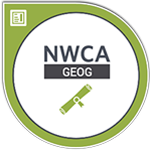PURPOSE
The Geography credential captures the essential competencies for knowledge related to geographical regions of the world and the historical and geopolitical forces that have affected demographics, environments, and economies.
AUDIENCE
The Geography credential is appropriate for those that require knowledge of geography and geopolitical concepts including demographers, cartographers, environmental consultants, climatologists, ecologists, historians, political scientists, government and Foreign Service professionals, urban planners, teachers, emergency managers, and sociologists.
JOB/CAREER REQUIREMENTS
The Geography credential captures competencies including overall knowledge of physical world geography, ecosystems, demographic shifts, and the effects of policy on these disciplines. Though many of these positions require appropriate education at various levels, and additional training, a fundamental understanding of geography provides a foundation that supports many aspects of daily tasks and decision-making.
GEOGRAPHY WORKPLACE TASKS:
- Demographers study the makeup, distribution, and trends of populations, making observations about the causes and effects of population changes for governments, social service agencies, and private companies. They collect statistical data, analyze data to identify trends, and predict future trends.
- Cartographers study, design, produce, and distribute digital and conventional maps, charts, spreadsheets, and diagrams for public and private sector consumers. Most work involves the use of technology.
- Environmental consultants assess air, land, and water contamination, perform environmental impact assessments and audits, design and execute waste management policies, and develop environmental management systems. They conduct field studies, interpret data, develop conceptual models, write reports, and communicate with stakeholders.
- Climatologists use satellites, radar, and other technology to measure climate conditions and then develop computer models to predict weather patterns. This information is used by farmers, utilities, insurers, builders, transportation companies, and multinational organizations.
- Ecologists perform fieldwork including sample testing and researching human activity impacts to prepare reports and make policy recommendations regarding land, air, and water management.
- Historians gather and analyze historical data, engage the public in educational programs, archive and preserve materials and artifacts, provide guidance on historical topics and preservation issues, and write reports, articles, and media pieces on historical topics.
- Political scientists research and study political subjects, collect and analyze data, monitor current events and policy decisions, evaluate effects of policies on the people, and present research through reports, presentations, and articles.
- Government and Foreign Service professionals devise and execute policy decisions that affect constituents.
- Urban planners develop plans for the use of land. They gather and analyze economic and environmental studies, censuses and market data; conduct field investigations; review site development plans; assess proposal feasibility; and present projects to communities, planning officials, and planning commissions.
- Teachers research geography topics, develop curricula, present educational lessons using a variety of formats, and at many different levels of education, and evaluate learning.
- Emergency managers plan, direct, and administer emergency management programs and plans, acting as liaisons between government and the public. They organize disaster drills, conduct training, provide public information, and assess government disaster and emergency preparedness plans.
- Sociologists research theories related to historical and social issues, collect and analyze data, report findings, and advise different groups on policy and sociological issues.
EXAM STRUCTURE OVERVIEW
Number of Questions in Exam: 65
Total Time: 45 minutes
Overall Passing Score: 70%
(All sections require an individual passing score of 70%)

